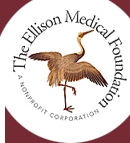 | Michael J. Bertram, Ph.D.
University of Alabama - Birmingham | | Genetic Analysis of the MORF4 Related Gene Family in Drosophila: Insights into Cellular Senescence
2001 New Scholar Award in Aging

In vitro cellular senescence, since its first description in the literature, has been put forward as a model for aging in species with
mitotically active tissues. Evidence suggests that sub-lethal levels of DNA damage, including telomere loss, induce the cellular
senescence phenotype in normal human... (more) |
|
 | Sandy Chang, M.D.,Ph.D
M.D. Anderson Cancer Center | | Genomic Instability and Aging in Werner-Telomerase Compound Knockout Mice
2001 New Scholar Award in Aging

Genetic studies of human progeric syndromes have enhanced our understanding the molecular mechanisms of the aging process.
Werner Syndrome (WS) is the segmental progeria considered to be most similar to natural senescence. WS fibroblasts display
premature replicative senescence in culture and increased rates of telomere... (more)(The first year of this research was conducted at Dana Farber Cancer Institute.) |
|
 | Michael D. Ehlers, M.D., Ph.D.
Duke University Medical Center | | Molecular Mechanisms of Age-Related Changes at Hippocampal Synapses
2001 New Scholar Award in Aging

Normal aging is associated with selective changes in cognition that are attributable, in part, to a decline in
hippocampal-dependent memory and changes in hippocampal synaptic plasticity. Indeed, altered hippocampal synaptic
function provides one of the primary electrophysiological markers for memory deficits during aging.... (more) |
|
Roman Giger, Ph.D.
University of Rochester Medical Center | | Mechanisms of Neural Plasticity in the Mammalian System
2001 New Scholar Award in Aging

There is growing evidence that the molecular mechanisms that underlie the sculpting of neuronal networks during development
also apply to aspects of adult neuronal plasticity and repair. Several families of molecules that regulate axonal pathfinding in the
developing nervous system have been described. However, little is known about the... (more) |
|
Yasunori Hayashi, M.D., Ph.D.
Massachusetts Institute of Technology | | Role of Neural Progenitors in Adult Hippocampal- and Olfactory Bulb-Dependent Learning and Memory
2001 New Scholar Award in Aging

Recent studies have demonstrated that neural stem cells exist in the adult nervous system of both lower vertebrates and phylogenetically higher
mammalian organisms, including humans. These findings raise the possibility that new neurons continue to be produced naturally in the adult brain even
after... (more) |
|
Kyung-Tai Min, Ph.D.
National Institute of Neurological Disorders and Stroke, National Institutes of Health | | Life Extension of Drospohila by a Drug Treatment
2001 New Scholar Award in Aging

Aging is a common phenomenon shared by animals and plants, but our
understanding of why and how we age remains limited. It would be of great
biological interest and practical importance if we could gain insights into the
molecular basis of aging, learn to delay the aging process, and maintain the vigor
of youth.
Model organisms amenable to... (more) |
|
 | William A. Mohler, Ph.D.
University of Connecticut Health Center | | New Approaches to Characterizing Cellular Changes in Sarcopenia
2001 New Scholar Award in Aging

Sarcopenia, progressive loss of muscle mass and quality, is the principle component of the profound
changes in body composition that occur with aging, and it is a large factor in loss of strength, deficits in
gait, and reduced metabolic rate in the elderly. We will apply two novel methods to characterize the
cellular changes... (more) |
|
 | Robert Sheaff, Ph.D.
University of Minnesota Cancer Center | | A Mechanistic Explanation for the Development of Neurodegenerative Diseases
2001 New Scholar Award in Aging

Neurodegenerative diseases share many molecular and pathological similarities,
yet no unifying explanation exists to explain how and why they arise. We
propose that defects in a novel biological system underlie development of these
disorders, and will test this hypothesis by investigating a defining feature... (more) |
|
 | David A. Sinclair, Ph.D.
Harvard Medical School | | Identification of Genes and Compounds that Extend Yeast Life Span
2001 New Scholar Award in Aging

Belying the complexity of the aging process, relatively minor changes to the
environment or genetic make-up of an organism can dramatically slow the rate
at which it ages. The question thus arises: How can seemingly simple changes
have such profound effects on aging? Recent findings suggest that the pace of
aging is actually... (more) |
|
 | David G. Wells, Ph.D.
Yale University School of Medicine | | Synaptic Plasticity in the Aging Brain: Role of CPE-dependent Protein Synthesis
2001 New Scholar Award in Aging

The formation and maintenance of memories is one of the brain's most
intriguing functions. The human brain has the remarkable ability to store and
retrieve past experiences for years and in some instances decades. Changes in
memory occur with age and there is increasing evidence that there is a
considerable... (more) |
|

